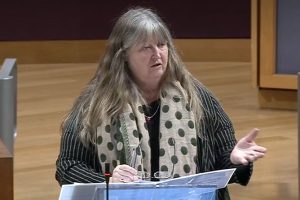A PIONEERING pilot program led by Hybu Cig Cymru–Meat Promotion Wales (HCC) has received high praise from a Welsh sheep farmer, who commends the initiative for its valuable improvements in his flock’s efficiency. The pilot, launched as part of the Hill Ram Scheme in autumn 2022, focuses on investigating worm resistance and hill sheep resilience through genetic analysis.
With the growing ability of worms to survive standard wormer treatments, controlling worms has become a crucial issue for sheep farmers, impacting both efficiency and profitability. The industry is now searching for a solution that reduces reliance on veterinary intervention, improves sheep health, lowers costs, and minimizes labor requirements.
To address these challenges, HCC initiated a trial involving ten farmers from the Hill Ram Scheme, who provided a total of 999 sheep. The trial aimed to assess the feasibility of developing estimated breeding values (EBVs) to determine the genetic ability of sheep to resist internal worm parasites. This research marks the first of its kind in the industry.
Among the participants in the research was Peter James, a farmer who operates Hafod y Pant farm above Llandovery alongside his father Alwyn, as well as a second holding in Trecastle on Bannau Brycheiniog. Peter contributed 150 improved Welsh mountain lambs to the trial, which has already yielded significant data for their farm business.
Expressing his satisfaction, Peter stated, “Everything to do with the trial has been very positive, and I sincerely hope the project receives support to extend its lifespan. Whatever happens, I will be repeating the process of the pilot this year because we have already seen some benefits.” He further explained, “One ram in the flock was highlighted as being prone to worm infection, so we were able to cut our losses and remove him from our breeding program. We can also follow that process through with his daughters to prevent any further negative impact on the flock, which is a huge development for us.”
Dr. Heather McCalman, HCC Programme Delivery Coordinator, emphasized the significance of the pilot, saying, “Worms are very prevalent in most sheep systems and can cause severe damage to the stomach lining, resulting in significant weight loss and illness. Across the industry here in Wales, we are all looking to achieve a healthy and productive flock.”
Dr. McCalman also noted the impact of climate change on worm infestations, explaining, “Worms respond to warm weather and moisture, but with the seasons changing, it means farmers can be less sure of when to treat their flock.” She highlighted the importance of sustainable approaches and genetics in ensuring healthy animals and the production of quality food for consumers, adding, “Using techniques like faecal egg count reduction tests, farmers have found that treatments over time have become less effective and are looking into sustainable approaches; using genetics is a key factor in our work to ensure healthy animals and that quality food is produced for our consumers.”
The Hill Ram Scheme, one of the three five-year projects in the Red Meat Development Programme, receives funding from the Welsh Government Rural Communities – Rural Development Programme 2014-2020, which is supported by the European Agricultural Fund for Rural Development and the Welsh Government. With a focus on empowering Welsh hill farmers with data and genetic information through advanced DNA technology, the scheme aims to enhance traditional farming systems with scientific interventions. Over 50 farmers from across Wales have participated in the scheme, which has proven to be a valuable resource for the industry.
For more information on the Hill Ram Scheme and the Red Meat Development Programme, readers can visit the HCC website.
















